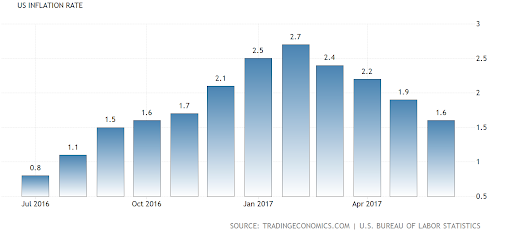(Drivebycuriosity) - It looks like inflation is dead. Last week the US labor department reported that U.S. consumer prices were unchanged in June and increased just 1.6% in the recent 12 months ( cnbc). The so-called core inflation rate, which strips out food and energy costs, edged up 0.1% in June, and increased 1.7% year-on-year.
The US inflation numbers were lower than the analysts had expected and below the projections of the Federal Reserve Bank (graphs tradingeconomics ).
I think that the low inflation rates are at least partly caused by the Internet, automation & other aspects of the technological progress. New technologies are reducing the costs of producing & distributing stuff and therefore curb inflation. I call this the Amazon effect because the e-commerce pioneer is the bellwether of this development.
Since going online Amazon has been been obsessed with efficiency, cost cutting and delivering goods cheap, fast & reliably. They have been constructing a network of huge fulfillment centers which are very efficient and save a lot of costs. Customers spend muss less money & time when they get things delivered at home. Amazon`s growth forces competitors like Walmart & Target to act similarly and to become more efficient & to curb their prices as well.
Today Jet.com, owned by Walmart, and many other e-commerce companies are competing with Amazon which forces them all to sell at low prices. Even Google & Facebook are participating in the battle for the online customer. As a result everything what can be ordered online is relatively cheap and prices for many goods are falling. This way the Amazon effect is keeping a lid on inflation by partly compensating the rising costs for services like health care & for the climbing rents.
If Amazon succeeds with her plan to buy Wholefoods the grocery sector will get more efficient as well and food prices will be constrained. But don´t expect that the Amazon effect leads to a deflation, meaning a general falling price level. Today most of the consumer spending goes to the service sector including housing, entertainment and health care which are still getting more expensive.
But the Amazon effect is reducing financial burdens for consumers, especially for low income households, and is so benefiting the whole economy.





No comments:
Post a Comment